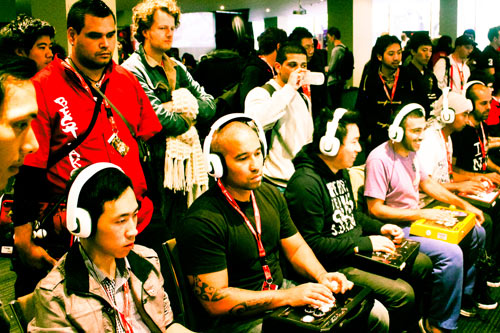Shadowloo Showdown 2012
MELD’S Leon Saw rubs shoulders with video gaming royalty and gives you the lowdown on this year’s Shadowloo Showdown, Melbourne’s premier fighting game contest.

Gamers battle it out at Shadowloo Showdown Melbourne 2012. Photo: Simon Tay
Shadowloo Showdown 2012 was a mind-boggling display of dexterous hand eye coordination and nimble finger work, with players from all over the world competing in fighting games such as Super Street Fighter IV, Tekken Tag Tournament 2 Unlimited, The King of Fighters XIII, and Ultimate Marvel vs Capcom 3, for money, prizes, and of course bragging rights.
The bouts were intense with fireballs and projectiles hurled all around, flurries of punches and kicks thrown in rapid succession, and knockouts dished out in spades.
Tournament organiser Ali Abdo and his brothers started Shadowloo Showdown three years ago as a grassroots initiative to showcase local fighting game talent and attract some international competition.
They wanted international participation because according to Ali, “that’s what people want to see”.
“You want to get better by playing the better players that are most of the time from Japan or South Korea, America,” he said.
The tournament has since grown tremendously with qualifiers being staged in countries such as America, China, Dubai, France, Japan, Kuwait, New Zealand, Singapore, South Korea, and United Kingdom, and their winners “flown down to Shadowloo Showdown”.

Photo: Simon Tay
At first, it was really tough sourcing for organisations or people willing to fund the competition.
“Maybe they’ll give you prizes here and there, but most of the money had to come out of our own pockets or from donations from some of the Melbourne communities and some other fighting game communities,” Ali recalled.
Now with the tournament’s increased international appeal, this year’s Shadowloo Showdown boasted a sizable prize pool, and sponsorship from prominent enterprises such as BenQ, GameSpot AU, Gigabyte, Razer, and SEGA Australia.

Photo: Simon Tay
So after the dust settled with the victors standing tall and mighty atop rather large heaps of bruised and bloodied egos, Japan was the competition’s biggest winners with their players taking home the Soul Calibur V, Street Fighter III, Super Street Fighter IV, and Virtua Fighter 5 titles, followed by the US walking away with victories in Skullgirls and Ultimate Marvel vs. Capcom 3.
Other East Asian nations didn’t fare too badly with competitors from China and Taiwan, prevailing in The King of Fighter XIII and Street Fighter x Tekken respectively, and Australians were given something to cheer about as one of their own took out Tekken Tag Tournament 2 Unlimited.
More than AU$20,000 worth of prizes were presented at the conclusion of the two-day event.
But before you decide to dump your textbooks and live off playing video games, renowned American professional fighting game player Justin Wong, 26, who is also Shadowloo Showdown 2012’s Skullgirls champion, on top of making it to the quarterfinals of every other game played at the tournament, has some words of advice.
“Never choose video games first, always choose school first, because it’s basically what you should focus on in life. Video games: that’s a dream. But school is not a dream, its real life. You have to handle real life first before you start dreaming,” he cautioned.

Justin Wong (right) with Meld photographer Simon Tay.
“Basically, when I was still going to school, I made sure that I do all my studies right then I hit the arcades and the consoles,” he said.
Justin began playing fighting games competitively when he was 14, though his family was not in favour of it.
“Since I’m Asian, they believe in the strict Asian ways: go to school, get a job, get married, cycle of life type of stuff,” he said.
Has he won them over with his international success?
“They don’t mind it, but they’re not 100 percent for it,” he conceded.
Justin was actually a community manager at a game development company before deciding to quit and focus completely on his professional gaming career.
“They didn’t like the fact that I had to travel so much, and then I just had to make a really crucial decision,” he said.
And while it wasn’t by any stretch of the imagination, an easy decision, he rationalised saying, “I won’t be able to do this when I’m older, but I can always go back to work. I’ve already established a safe career back home for when after I’m done playing Street Fighter competitively.”
Thus far, all of Justin’s sacrifices, combined with the staggering volume of hours he has put into honing his fighting game skills, have paid off handsomely and he’s now living his dream.
“A lot of people envy it because I travel a lot. Not a lot of people in the world can say, oh, I’m going to go to Japan, I’m going to go to Australia, I’m going to go here. Most people just live normal lives, so this is kind of like a dream come true for a lot of people. It’s a once in a lifetime experience.”

Meld's tech editor Leon Saw with Tekken Cosplayers.
